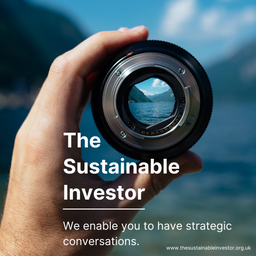
Sunday Brunch: audit - the risk hiding in plain sight
Audits matter. Much of the time investors don't get the data that underpins a company strategy. It's confidential. And so we rely on the auditor to check it. And this should include sustainability strategy. But, often it doesn't. That needs to change.
I don't frequently write about accounting. I find that most sustainability professionals find it, well boring. And many investors take it for granted, they assume that the financial numbers they use are reliable. At least until they are proven not to be.
Sitting behind all of the financial data we use as investors is the audit. It's hard to overstate how important this process is in validating and checking what companies disclose and report.
But it's not just an issue for financial people. As the nature of sustainability reporting changes, the role of audit in sustainability is becoming increasingly important. This is not just about validating reported data on issues such as GHG emissions.
We also need a company's sustainability strategy to be tied back into the company's wider financial strategy. And we need to understand the financial implications of the investment decisions the company has selected. Even if you believe that companies should take actions for non financial reasons, as an investor you still need to understand the financial implications.
Audit is important to all of us. Which is why a recent report from Railpen is so important and worthy of your time. The report is entitled Acting on Audit, and it clearly sets out why we need to care about the audit function. Plus, why we need to act to improve it and what we can do.
Acting on Audit - an investor stewardship perspective
Audit is the foundation on which the investment industry sits. If the financial data that companies disclose is incorrect, or even worse fraudulent, then investors cannot make sensible investment decisions.
And like most foundations, we tend to take them for granted. Until they fail. All good investors know, and have hopefully learnt from, the audit related financial collapses stretching from Wirecard all the way back to Enron.

As the Railpen report puts it:
"high quality audit can serve the public interest by: reinforcing trust and confidence in the accuracy of financial reporting; reducing the risk of inaccurate information or fraud; and strengthening corporate accountability to investors through increased transparency".
And it's not just 'pure' financial data that we should care about. An increasing number of companies provide detailed reports on their sustainability strategies. If these are not deliverable, if they are just hopes and dreams, then investors and sustainability professionals cannot rely on them.

Auditors are often the people best placed to comment on the practicality of a company's sustainability strategy. And yet, nearly all do not.
Given this, we would expect that investors would care a lot about audit. That they would see a good audit as being part of the really important reports and disclosures from the companies they are invested in. That monitoring audit would be something that they would allocate resources to.
And yet, this does not appear to be the case.
Again quoting the Railpen report:
First up, yes, audit is seen as an issue...."investors have concerns about the usefulness of audit information they receive and believe there is scope for improvement".
And yet ...
But, it's not something that most investors are acting on ...."there are currently low levels of investor engagement in audit issues".
Why might this be the case, and what can we do to improve this? The Railpen report suggests that the lack of action appears to be due to a lack of resource among both asset managers and asset owners, as well as a lack of understanding of the impact and technical aspects of auditing. My experience bears this out. Many investors I speak with feel that companies are not giving them the information they need to make sensible investment decisions.
But most of the time this shortfall is not seen as being linked to audit. And even when it is they don't see audit as something that can be changed. After all 'it's scope and coverage is regulated, so I cannot ask for more from the auditor and the audit committee'.
So - what can investors do to improve this?
The most obvious actions relate to voting. Companies ask shareholders, at the AGM, to ratify the appointment of the auditor. If we are not happy with the scope of the audit, or the disclosures it delivers, then we can vote against the auditors appointment.
And obviously, before we do so, we explain to the company what the shortfall in disclosure is, and what we want done to remedy it. In other words - engagement.
But, we can also do more, either individually or collectively. We can engage with audit committees and the audit industry on the broader audit issues. And we can more actively participate in the policy-making and standard-setting process.
Yes, I understand the resource constraint, but to use an engineering analogy - a lack of resource in the design phase is not a legitimate explanation when your building falls down.

How does this relate to sustainability?
This is not just about pure financial disclosure. Shareholder climate-related disclosure requirements are shifting from a focus on net zero alignment and carbon emissions reduction targets (i.e. a high-level climate strategy), to one that provides better financial disclosure. This encompasses the different outcomes that could occur, the underpinning assumptions of the company’s selected climate-related strategy, the concrete actions they plan to take, how well these are aligned with the wider company strategy, and the financial implications of the choices they are making.
Which not only means that as investors we need better financial disclosure on sustainability issues, but we also need the auditors to check and validate the assumptions and conclusions. Yes, this is currently outside of the scope of the regulation around audit. But that doesn't mean it cannot be changed.
Expanding the role of the auditor is not a new idea. Professional bodies such as the Institute of Chartered Accountants in England and Wales (ICAEW) have been considering this for some time. As they said in a report as part of the Future of Audit back in 2019 “While the current audit model does not involve any form of assurance or commentary on the full annual report – none of these things are impossible”. (What auditors do: the scope of audit).
And as a recent Accounting for Sustainability (A4S) contribution to The Investor Forum set out, there is already a desire by companies for investors to be more assertive in their expectations, while recognising the complexity that arises from changing regulation, diverse stakeholder expectations, and emerging technical issues. (The Investor Forum 2023 Review page 32).
One last thought
Accounting matters. Accounting is the language of business - most investors would be lost without accounting numbers. Sustainability professionals need to learn more about how accounting disclosure is used (and abused). If we want to get investors to change, we need to learn to speak their language.
And a big part of this is updating the role and delivery of audit.

Please read: important legal stuff.





